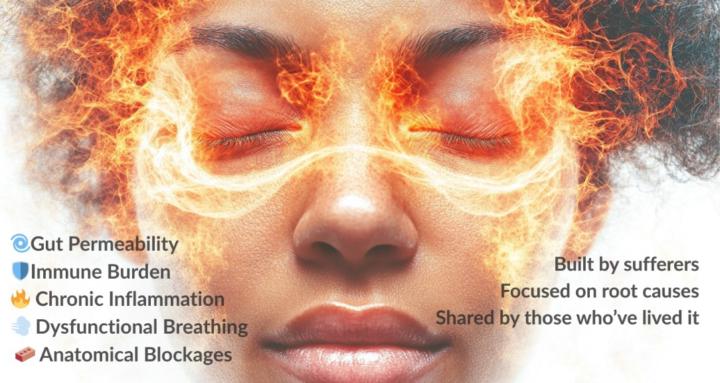Apr '25 (edited) • Regenerative Therapies
Gut Dysbiosis & Chronic Rhinosinusitis (CRS): My Current Exploration
Hey everyone —
I’ve been revisiting the connection between gut dysbiosis and Chronic Rhinosinusitis. It's something I’ve looked into before, but despite experimenting with various diets and supplements, nothing had really moved the needle—until now (hopefully!).
Here’s an updated overview of what I’ve learned and what I’m currently trialling, based on protocols from Dr. Dietrich Klinghardt, along with some personal observations.
🧬 Overview: What Is Gut Dysbiosis?
Gut dysbiosis refers to an imbalance in the gut microbiome—where “bad” or opportunistic microorganisms outnumber the beneficial ones. This can cause systemic immune dysregulation, which is highly relevant in conditions like CRS.
When dysbiosis is present, the immune system is essentially in a constant state of alert, treating the imbalance like a low-grade infection. This chronic inflammation may contribute to the ongoing sinus inflammation seen in CRS.
Research connection: Several studies have shown that patients with chronic inflammatory conditions—including CRS—often have measurable alterations in their gut microbiota. One study found that CRS patients had significantly reduced microbial diversity and increased markers of intestinal permeability (aka leaky gut), which often coexists with dysbiosis.
🔍 Clinical Signs & Symptoms of Gut Dysbiosis
- Bloating
- Gas
- Diarrhea or constipation
- Abdominal pain or cramping
- Heartburn or reflux
- Undigested food in the stool
- Brain fog
- Fatigue
- Mild food sensitivities
- Skin issues (eczema, acne, rosacea)
🧪 Personal Signs I’ve Noticed: These are subtle and took time to observe:
- Teeth discoloration and plaque buildup increases the more FODMAPs I eat (fermentable carbs). When my diet is simpler, my teeth and gums feel noticeably cleaner.
- Lower-right abdominal pain, particularly near the ileocecal valve.
- Mild sensitivities to foods like eggs, wheat, and caffeine—symptoms I initially ignored or didn’t link to gut health.
🌱 Method: Healing the Gut
The general principle I’m following:“Prune the garden before replanting it.”
That means:
- Remove pathogens and excess bad bacteria.
- Avoid feeding them (dietary changes).
- Support digestion and detox pathways.
- Rebuild the microbiome carefully and intentionally.
🍽️ Diet Protocol
A modified ketogenic-style low FODMAP diet for 6–12 weeks, designed to starve opportunistic bacteria while supporting the body’s healing.
Key points:
- Exclude: Eggs, dairy, caffeine, and high-FODMAP foods (e.g., garlic, onions, legumes).
- Focus on clean, anti-inflammatory foods: low-sugar vegetables, healthy fats, and lean proteins.
📝 Personal tip: I didn’t realise I had an egg sensitivity until I excluded them. Sometimes we become desensitised to our body's signals—better to avoid common offenders during this reset phase.
💊 Supplementation: Based on Dr. Klinghardt’s protocols, the following are core components:
🌿 BioPure 10-in-1 Rizol Oils
- Ozonated essential oils designed to target harmful microbes.
- Antimicrobial and anti-parasitic properties.🔗 https://www.biopure.eu/us/extracts/oil/o3-oils-rizol/255/r-klinghardt-spezial-rizol
🧬 Digestive Enzymes
- Helps break down food and reduce fermentation in the gut.
- Can improve nutrient absorption and reduce symptoms like bloating or discomfort.
Other options include binders (e.g., charcoal or bentonite clay) to mop up endotoxins as the bad bacteria die off—but these should be used carefully and under guidance.
🧠 Reflections
One of the biggest things that held me back was thinking:
“My gut symptoms aren’t bad enough to be the problem.”
But subtle doesn’t mean insignificant. In my case, it took deliberate observation and dietary experimentation to realise how much my body was reacting to certain foods. Don’t dismiss your symptoms just because they’re not extreme.
🗣️ Final Note
👉 Please do interact with these posts — like, comment, share your experiences. My ambition for this group is to build something meaningful. If we can get the engagement up, we can attract incredibly talented chronic disease specialists to provide valuable info at low or no cost to you all. The more activity here, the more we can all benefit.
⚠️ Disclaimer
This is not medical advice, but rather my personal interpretation and experience of Dr. Klinghardt’s dysbiosis protocol. Please consult with a qualified practitioner before starting any new supplement or diet programme.
0
2 comments
powered by

skool.com/chronic-rhinosinusitis-program-6064
Empowering those with chronic rhinitis & sinusitis to resolve root causes through evidence-based protocols, shared strategies, and community support
Suggested communities
Powered by
